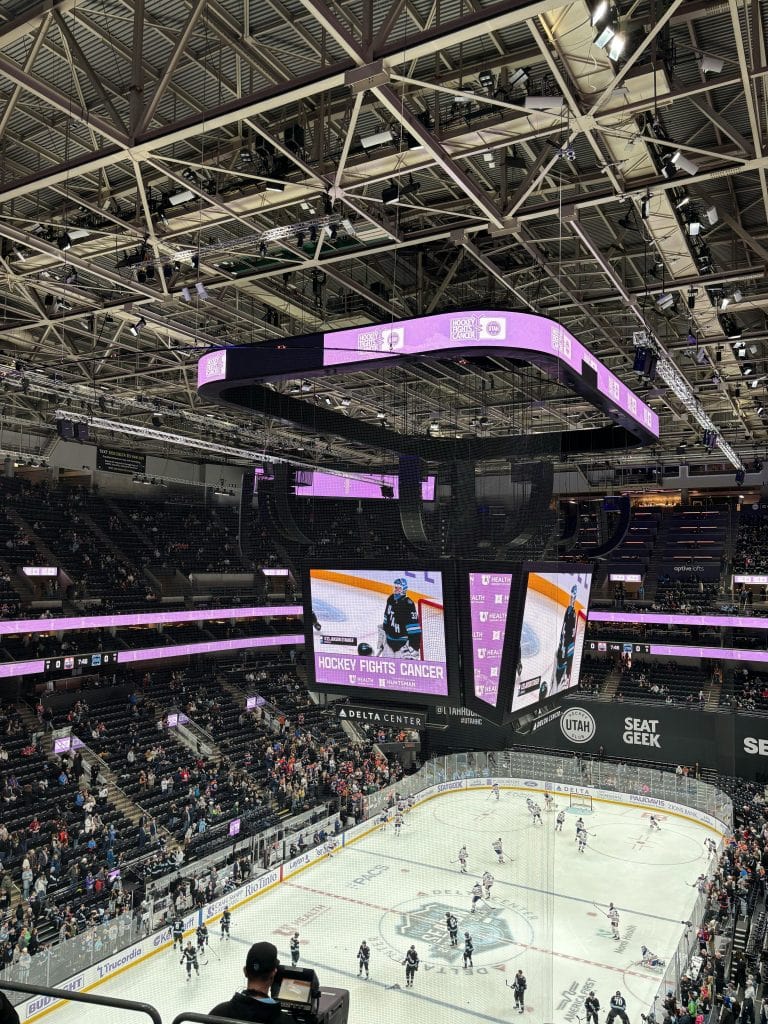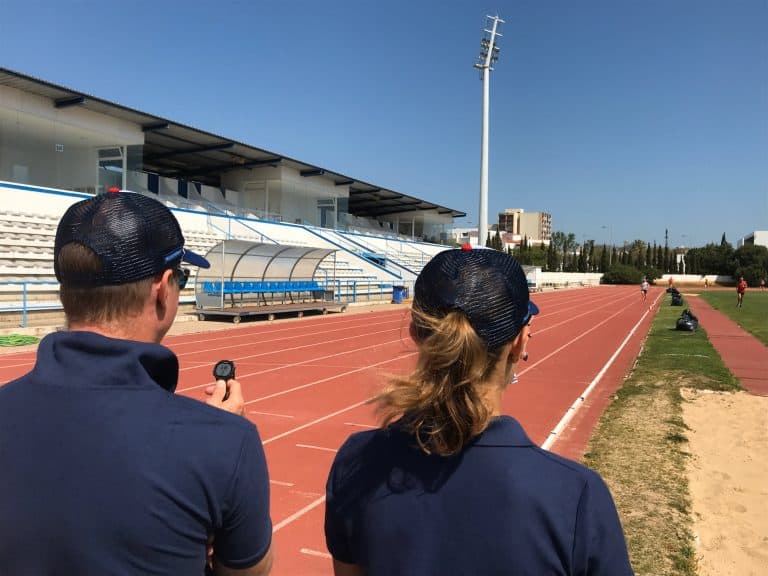In the world of elite sports, performance psychology is no longer a niche concept, it’s a necessity. Few understand this better than Dr. Vincent Lodato, Executive Director of Mental Conditioning at the National Sports Performance Institute and Director of Mental Wellness and Player Performance at Utah Hockey Club. With over two decades of experience in sport psychology and mental conditioning, Vincent plays a pivotal role in shaping the psychological resilience and development of professional athletes.
Most recently, his expertise in mental performance and player development is helping shape the future of Utah Hockey Club as they transition from their origins as the Arizona Coyotes to their new identity in Utah; and through his partnership with Athlete Assessments, Vincent has integrated the DISC behavioral assessment into his work, providing invaluable insights into player behavior, leadership styles, and team dynamics.
A Career Built on Performance Psychology
Vincent’s journey into sport psychology began more than 30 years ago when the field was still in its infancy. “There really wasn’t much of a profession per se,” Vincent recalls. “I was a member of the Association for the Advancement of Applied Sport psychology – which tells you a bit about where the field was 30-plus years ago.”
Vincent shared that his background as a licensed clinical social worker and mental health practitioner laid the foundation for his career in professional sport. When the Tampa Bay Rays were formed 24 years ago, they were seeking a clinician to support their players; marking the beginning of his journey in the field.
Over the years, he pursued further education, earning his doctorate in sport and performance psychology and becoming a Certified Mental Performance Consultant. His expertise bridges the spectrum of mental wellness, mental health, and mental performance. “I kind of navigate that continuum,” he explained.
When Utah Hockey Club (formerly the Arizona Coyotes) was seeking expertise in draft assessments and player evaluations, Vincent’s name surfaced through back-channel recommendations.
“My dissertation was in trait personality as a prediction of future success in professional baseball,” he says. “They reached out, and that evolved into my current role as Director of Mental Wellness and Player Performance.”
The Evolution of Sport psychology
Reflecting on the industry’s transformation over the past three decades, Vincent notes significant advancements in standardization and integration.
“Sport psychology has moved towards a more unified profession with credentialed, board-certified individuals,”
he stated. The field has become more structured, shifting from a fragmented landscape of varied theoretical backgrounds to an integrated discipline that considers the whole person.
“It’s becoming much more of a true profession.”
Day-to-Day Impact: Assessments, Development, and Player Growth
Vincent’s work is deeply embedded in player development, using assessments like Athlete Assessments’ AthleteDISC Profiles to better understand the athletes.
“Assessments to me are the starting point, a foundation. From there it’s knowledge of the sport, the culture, knowledge of where these young athletes are at when they’re coming through; either junior hockey, collegiate programs, playing in Europe or high school programs,”
he explained. Given that hockey players are scattered across North America and Europe, most interviews take place virtually.
“The assessment provides a foundation, rather than just relying on raw scores,”
he said, emphasizing the importance of understanding an athlete’s behavior within their sporting context. Explaining he says,
“DISC gives me clues to the person without labeling or making hard and fast judgements”.
Beyond the draft process, Vincent plays a critical role in the players’ ongoing development, “Once we draft these players, I spend time with them at development camps, follow their progress in junior leagues, and provide ongoing support,” he shared. His approach is both analytical and relational – focusing on strengths, areas for growth, and building resilience.
“They’re still unfinished products as human beings, they’re not 25 or 30 yet; They’re younger, they’re open to working together, and we use these assessments as a foundation to find their strengths, areas of growth, and areas we need to put time into,”
he notes, highlighting the importance of personalized development.
Speaking to the value of Athlete Assessments’ DISC Profiles in his work, Vincent shared, “One of the real interesting assets of DISC is that I can administer it to both players [AthleteDISC] and coaches [CoachDISC],” he shares. The ability to compare profiles, fosters stronger team dynamics by identifying areas of synergy and potential tension. “It’s incredibly useful to see where we’re in sync and where adjustments are needed.”
Coaches have been particularly receptive to the insights provided by DISC, and open to feedback on where they might need to adjust their approach, with Vince sharing this has led to enhancing their coaching effectiveness and strengthening their relationships with players.
From Individual to Team Performance: The DISC Impact
The benefits of DISC don’t stop at individual assessments; they extend to team cohesion and recruitment. “We’re just starting to look at how we balance various DISC Profiles within the team dynamic,” Vincent explained. Hockey is a uniquely collaborative sport, and understanding behavioral styles can inform recruitment and development decisions. However, he is careful not to over-rely on assessments alone. “I don’t recommend making coaching decisions solely based on assessments,” he clarified. Instead, the information helps determine whether an organization has the resources to develop a particular player effectively.
The DISC tool also accelerates player development.
“It can cut down an entire six months or a season of just getting to know the player,” Vincent points out. This enables the coaching staff to hit the ground running, addressing a player’s needs immediately.
Building Resilient Athletes: The Mental Game
Success in professional sports isn’t just about physical talent – it’s about mental toughness. Vincent’s holistic assessments help players understand how they respond to stress, pressure, and adversity.
“The best predictor of future behavior is past behavior,”
he explained. By analyzing how players have performed in high-stakes environments, such as international tournaments, Vincent gains insight into their resilience and coping strategies. “Some athletes have been successful due to talent alone, but their approach to practice and training may need refinement,” he added.
For many young athletes, transitioning from junior leagues to professional environments is a challenge. “They’re going to fail, some of them for the first time,” Vincent said. His role involves teaching them how to navigate failure, develop structured goal-setting habits, and maintain focus.
“Talent got them here, but hard work will keep them here,” he emphasized.
Beyond the Game: The Importance of Balance
Both Athlete Assessments and Vincent recognize the importance of life balance in sustaining long-term success. “A lot of players are dominant and competitive on the ice, but some struggle to turn that off in their personal lives,” Vincent notes. His background in mental health allows him to help players manage their off-ice lives effectively. “Solid people make solid performers,” he says. The goal is not just to develop great athletes, but well-rounded individuals who can thrive both in and out of sport.
Looking to the Future: A Data-Driven Approach to Player Success
As sport psychology continues to evolve, the use of assessments and analytics will become even more integral to player development. However, Vincent stresses that numbers alone are not enough,
“You can have all the data in the world, but when a player steps into Yankee Stadium in front of 50,000 screaming fans, the real test begins.”
His approach ensures that players are not only prepared on paper but ready for the realities of high-pressure competition.
Through his work with the Utah Hockey Club, Vincent is helping shape the future of performance psychology in professional sports. By integrating DISC assessments, personalized development plans, and mental conditioning, he is equipping the next generation of athletes with the tools they need to succeed. “The DISC assessment really helps you individualize your work,” he concluded. And in a game where every edge matters, that individualized approach could make all the difference.
Where to from here?
The partnership between Athlete Assessments and Vincent Lodato demonstrates the powerful impact of sport psychology and behavioral assessment in professional sports. By leveraging tools like DISC, Vincent is providing players and coaches with insights that enhance both performance and personal development. If you, like Vince, are interested in enhancing your player and coach assessment process, find out more about Athlete Assessments’ Consultant DISC Accreditation Program.
Recommended Articles
Benefit from the experience of those who have already completed Athlete Assessments’ DISC Accreditation and how they are using the sport-specific DISC Profiles within their roles and work.
Dr. Ed Garrett, PsyD, BCMHC, CH-C, Director of Sport and Performance Psychology at California Baptist University, on his approach to developing people and teams in performance environments using DISC Profiling.
Dr. Megan Buning, CMPC, on Empowering Coaches, Game Officials, and Teams with Mental Performance Skills and the Practical Application of DISC Profiling.





